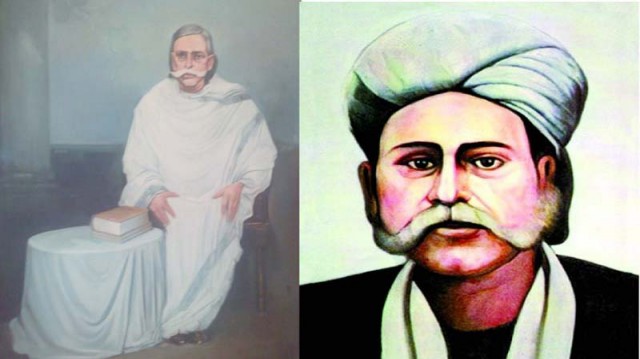Hasan Raja (1854–1922), zamindar, mystic devotee, and song writer. He goes by Dewan Hasan Raja Chowdhury in full. On January 24, 1854, Hasan Raja was born into a zamindar family in the village of Lakshmansree, located in the Sunamganj subdivision of the Sylhet district. Lakshmansree and Rampasha were under the zamindarship of his father, Dewan Ali Reza Chowdhury.
His mother was Hurmat Jahan Bibi. His ancestors were from Audh in Uttar Pradesh, and they initially lived in Jessore before moving to Sylhet. His grandfather, the Kshatriya Hindu Birendra Chandra Simha, often known as Babu Khan, converted to Islam alongside the Sylhet faujdar. Dewan Ali Reza Chowdhury, the father of Hasan Raja, founded his zamindari estate in Sylhet after inheriting a sizable amount of landed property from both his paternal and maternal forebears.
At the age of fifteen, Hasan Raja inherited the Zamindari estate from his father. He didn’t pursue any formal schooling. Similar to the majority of his peers in the aristocracy, Hasan received his education through customs and his family. Because of his intelligence and self-enlightenment, Hasan was able to successfully manage his zamindari estate for a considerable fifty-two years.
He was not above luxury and pleasure, or whim and caprice. In addition, he was giving, compassionate, and committed to helping the underprivileged. Hasan Raja saw a significant shift in his perspective on life as he grew older. He started writing mystic songs and became more spiritual after being influenced by a sufi.
These songs are the result of his artistic brilliance reflecting his spiritual and intellectual ideas. They became well-liked by the general public due to their clear and simple language presentation of spiritual truths. He gained a great deal of societal recognition both during and after his life for his mystical melodies. In Bangladesh, lyricist Hasan Raja is now well-known.
In 1914, Hasan Udas, an anthology of Hasan Raja’s songs, was released. This book contains 206 songs in total. The concept of God, loyalty to Him, and the spiritual relationship between the creator and the created beings are the songs’ central themes. In addition, these songs convey the impermanence of life, the frailty of human existence, and his sadness at his incapacity to engage in worship and meditation, as well as his helplessness, selflessness, and surrender to God. His idea of body-based metaphysics on the understanding of God and the soul is the outcome of combining his personal mysticism, classical bhababad, and Sufi concepts.
His songs, which were written in the Sylheti regional dialect, were once passed down orally from person to person. The songs of Hasan Raja are performed in today’s educated culture and disseminated via a variety of media. Rabindranath Tagore often quoted Hasan Raja in his explanations of religion, philosophy, and folklore. In this way, he presented Hasan Raja to the global society. The poet describes the Eternal person within him emerging and appearing before his eyes, just as the Vedic Rishi speaks of the person who in him, dwelling also in the heart of the Sun. Rabindranath quoted from his songs Momo akhi haite paida asman jamin and Rup dekhilam re nayane, apnar rup dekhilam re.
Hasan Raja expresses all of his feelings, emotions, concerns, and anxiety in relation to this “Eternal person.” He conveyed his heavenly love, devotion, affection, and delight, referring to this eternal being as Allah, Hari, Krishna, and so forth. He used to think there was no distinction between his “own self” (soul) and his “godhead” (divinity):
‘A rural poet of East Bengal’ is how Rabindranath Tagore described Hasan Raja in his address. It is true that Hasan Raja wrote his songs in the structure and manner of folk songs, but his songs’ themes heavily drew from his own experiences, feelings, and ideas, which elevated them above other typical folk songs.
Hasan Raja drenched his name and residence in these words of the song to the point where the subject of the song and the song itself seem to be one and the same. Despite incorporating regional vernacular and folk melodies into his compositions, his vocal approach remains distinct and entirely own. He is the only poet to write a song in this unique melody. Unlike other “folk-poets” or “rural poets,” Zamindar Hasan Raja is a “ascetic poet.” ‘Hasan Rajar Gan’ is the only appropriate and appropriate classification for his songs.
Hasan Raja’s second book to be released is a prose piece called Saukhin Bahar. The book’s central focus is an examination of the traits, nature, and outward look of various animals, including horses and elephants, women, and birds like korha (haor birds). His pastime was raising korha, horses, and elephants. He had many attractive damsels and female slaves living in his home. In light of his own experiences, he wrote this book. However, he fell short of maintaining decency, elegance, and taste in his description of the theme’s physical attributes, nature, and qualities, particularly those of the women folk. He will, nevertheless, always be recognized for Hasan Udas, his book. November 1922 saw his death at the age of 68.

